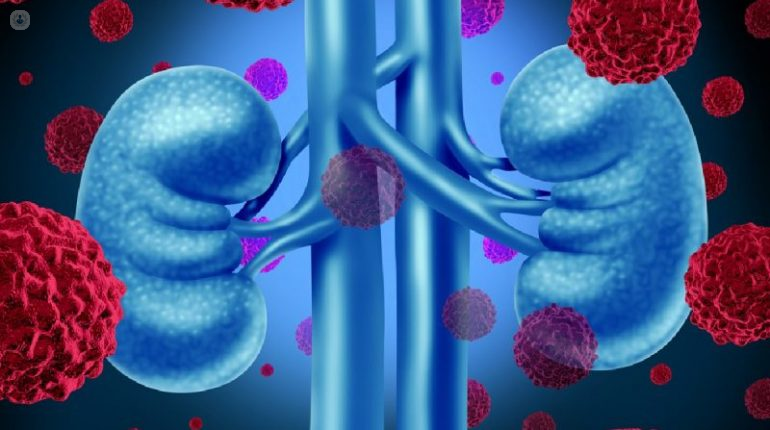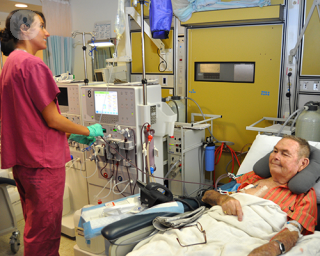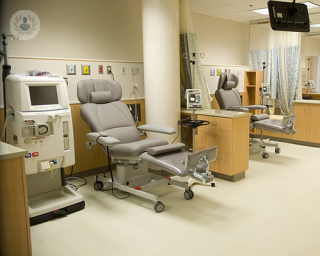Acute kidney failure
Dr Andrew Palmer - Nephrology
Created on: 11-13-2012
Updated on: 05-04-2023
Edited by: Aoife Maguire
What is kidney failure?
Renal failure, or kidney failure, occurs when the kidneys are damaged so are no longer able to fully perform their functions, leading to accumulation of dangerous waste products in the body, elevation of blood pressure and retention of excess fluids. If your kidneys fail, you will need regular treatment sessions that carry out the functions they used to carry out. Dialysis and kidney transplant are the current treatments advised. Each method has pros and cons; depending on the treatment selected, the patient will have to completely change their lifestyle, i.e. their diet, physical activity and everyday routine. There are two types of kidney failure:
- Acute renal failure (ARF): sudden impairment of renal function usually manifested via three functions: excretion, regulation of fluid volume and regulation of ion composition.
- Chronic renal failure (CRF): this type of renal failure is characterised by lack of symptoms until the effects worsen. It is important to diagnose the disease early because treatments will not have the desired effect in advanced stages of renal failure.
Prognosis
The disease is potentially fatal and it may require a type of intensive treatment, although the kidneys may function for a few weeks or months after the appropriate treatment is given. In other cases, chronic renal failure or end-stage renal disease is present. There is a higher risk of death when the renal failure is preceded by surgery, traumatic injury or serious infection in a patient with heart disease, lung disease or recent stroke. There are other factors that can increase the risk of death, including but not limited to: advanced age, infection, loss of blood from the gastrointestinal tract and when renal failure is progressive.
Symptoms of renal failure
Renal failure progresses slowly and sometimes the symptoms do not manifest until the disease is at an advanced stage. In the end stage of the disease, there may be some symptoms caused by accumulation of waste products and excess fluid in the body.
If the kidneys begin to fail, the following symptoms may occur:
- Itchiness
- Muscle cramps
- Nausea or vomiting
- Not feeling hunger
- Swelling of feet and ankles
- Excessive urine or not urinating enough
- Difficulty breathing
- Problems sleeping
In acute renal failure, one or more of the following symptoms may occur:
- Abdominal pain
- Back pain
- Diarrhoea
- Fever
- Nose bleeds
- Rash
- Vomiting
Medical tests for renal failure
Many patients may have generalised inflammation due to the retention of fluids. The physician may investigate the patient and hear a cardiac murmur, lung crackles or signs of inflammation of the lining of the heart when they auscultate the heart and lungs using a stethoscope. Tests vary from a few days to 2 weeks. Some of the tests are:
- BUN
- Creatinine clearance
- Serum creatinine
- Urinalysis
The specialist may also perform abdominal ultrasound with the aim of diagnosing renal failure. Other tests are an abdominal CT scan or also an abdominal MRI scan that can reveal whether there is an obstruction in the urinary tracts. Blood tests may help to diagnose some of the causes of renal failure. Arterial blood gases and blood biochemical analysis may reveal metabolic acidosis.
Causes of renal failure
Causes of and risk factors for renal failure are described below. In the first instance, it must be noted that there are several causes of the possible damage to the kidneys such as:
- Acute tubular necrosis (ATN)
- Renal autoimmune disease: acute nephritic syndrome or interstitial nephritis
- Reduced blood flow due to very low blood pressure, which may be caused by: burns, dehydration, haemorrhage, injury, septic shock, serious disease or surgery.
- Disorders that cause coagulation in the blood vessels of the kidney such as: haemolytic uraemic syndrome, idiopathic thrombocytopenic purpura (ITP), malignant hypertension, transfusion reaction or scleroderma.
- Infections that directly harm the kidney such as: acute pyelonephritis and septicaemia.
- Complications of pregnancy such as: placenta abruptio or placenta previa.
- An obstruction in the urinary tracts.
Can it be prevented?
It is difficult to prevent or predict renal failure. However the risk can be reduced by following these measures that promote good kidney health.
- Pay attention to the labelling of over-the-counter painkillers. Excessive intake of medications such as aspirin, paracetamol or ibuprofen may increase the risk of developing serious renal failure. If the patient has a kidney disease, diabetes or high blood pressure, taking these medications may increase the risk of developing renal failure.
- Medical support to avoid renal problems. In the case of patients with a kidney disease or a disorder that can increase the risk of developing renal failure such as diabetes or high blood pressure. The best prevention is to respect the treatment and to follow medical advice to reduce the effects of the disease.
- Attempt to lead a healthy lifestyle. An active lifestyle, balanced diet and abstainment from alcohol can help to prevent renal failure.
Treatment for renal failure
If the patient has life-threatening renal failure, they will need dialysis treatment or a kidney transplant to survive. Currently there is no cure for renal failure; however the life expectancy of many patients has been extended thanks to dialysis or following a kidney transplant. The specialist physician will analyse the best treatment for your situation. There are other treatments such as:
- Haemodialysis: this treatment uses a machine to clean the patient’s blood. It can be performed at a dialysis centre or at the patient’s home.
- Peritoneal dialysis: this treatment uses the lining of the abdomen called the peritoneum and a cleaning solution called dialysate to clean your blood. Peritoneal dialysis can be performed at the patient’s home or workplace if they cannot attend the medical centre.
- Kidney transplant: the healthy kidney may be from a living or deceased donor. The new kidney performs the functions that the patient’s own kidneys used to perform.
- Medical treatment: this is the alternative if the patient prefers not to start dialysis treatment or a kidney transplant. Medical treatment helps the patient to live better until their body stops working. It should be noted that medical treatment is not a cure for renal failure and the patient will not survive.
Which specialist treats it?
The medical specialist responsible for looking after the kidneys and urinary tracts is called a nephrologist. This specialist will determine whether the kidneys are affected, study the cause, the degree of infection and recommend appropriate care and treatment. When the nephrologist observes that the kidneys are not functioning correctly and cannot eliminate toxins, dialysis treatment is initiated.








